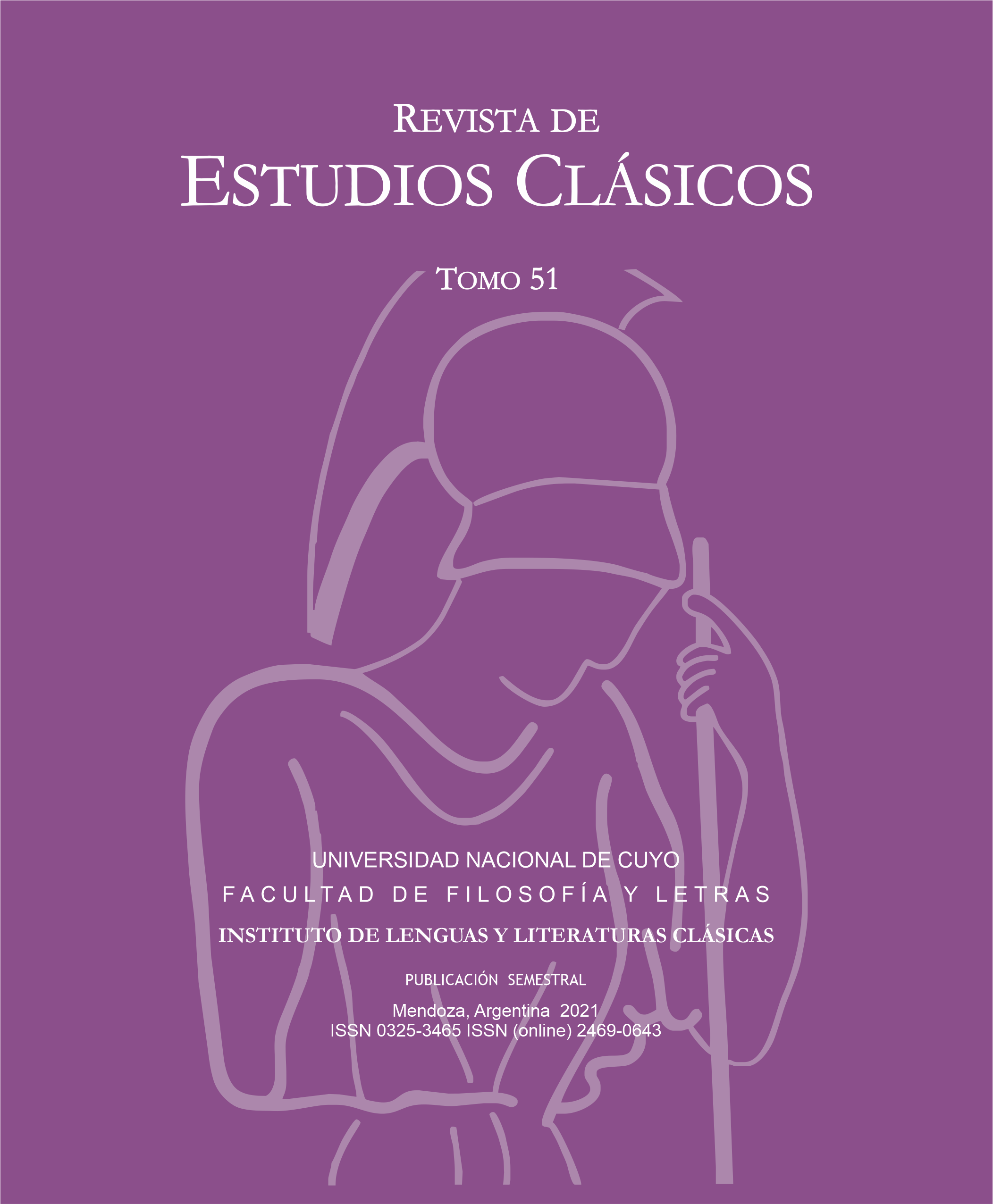Ambiguity of love in Virgil
Keywords:
Donatus, love, pederasty, VirgilAbstract
As most of the poets of every time and language, also Virgil dealt, among other themes, with the one of love, emphasizing how much it is powerful and, in another way, pernicious. It is not difficult to recognize, in most of the love events described by the poet, an unlucky or even tragic ending. This is a factor that, though being part of his substantially pessimistic vision of life, may likewise be the proof that ataraxy – including also the renunciation to love passion – according to him represents the true wisdom, as we can find in the background in several passages of Aeneid. As we can notice in the Vita Vergilii by Donatus, it is very probable that, at least in his youth, Virgil was captured by amorous feelings for children, but we can think that, in his riper age, his true, unique love was Rome, which he exalted like very few other poets.
References
AA. VV. (1981). Dizionario di Antichità classiche di Oxford. Roma: Edizione paoline.
Calame, C. (ed.) (1983). L’amore in Grecia. Bari, Laterza.
Calzecchi Onesti, R. (trad.) (1963). Omero. Iliade. Torino: Einaudi.
Calzecchi Onesti, R. (trad.) (1971). Virgilio, Eneide. Milano: Mondadori.
Canali, L. (trad.) (1994). Virgilio, Bucoliche. Milano.
Cantarella, E. (2006). Secondo natura. Bisessualità nel mondo antico. Milano: Rizzoli.
Cantarella, R. (ed.) (1964). Euripide, I Cretesi, testi e commento. Milano: Istit. Edit. Ital.
D’Anna, G. (1995). La concezione dell’amore in Virgilio. En Studi su Virgilio (pp. 21-31). Roma.
Dover, K. J. (1973). Classical Greek Attitudes to Sexual Behaviour. Arethusa 6. 69.
Foucault, M. (2004). Storia della sessualità, III, La cura di sé. Milano: Feltrinelli.
Grilli, A. (1982). Lettura del terzo libro. En Gigante, M. (ed.), Lecturae Vergilianae, II, Le Georgiche (pp. 87-120). Napoli.
Hirtzel, F. A. (ed.) (1963). P. Vergili Maronis Opera. Oxford.
La Penna, A. (1981). Lettura della terza bucolica. En Gigante, M. (ed.), Lecturae Vergilianae, I, Le Bucoliche (p. 152). Napoli.
La Penna, A. (1994). Il canto, il lavoro, il potere, introduzione a Virgilio, Georgiche, a cura di L. Canali, note di R. Scarcia. Milano.
Landolfi, L. (1985). Durus amor. L’ecfrasi georgica sull’insania erotica. Civ. class. crist. 6. 177-198
Maggi, A. (ed.) (1952). P. Vergilii Maronis. Opera. Torino: Paravia.
Miles, G. B. (1980). Virgil’s “Georgics”. A new interpretation. Berkeley-Los Angeles-London.
Nagy, G. (1999). Il migliore degli Achei. Baltimore: Johns Hopkins University Press.
Perotti, P. A. (1990). Il libro di Didone: una tragedia nell’Eneide. Prometheus 16. 238-243.
Perotti, P. A. (1991). Dorica castra, alius Achilles (A. VI 88-90). Maia 43. 195-¬198.
Perotti, P. A. (1997). La presenza di Ottaviano nell’Eneide: una messa a punto. Rudiae 9. 191-219.
Perotti, P. A. (2005). Creusa: solo un fantasma. Aufidus 19, nr. 56-57. 111-133.
Perotti, P. A. (2006). Due auto-imitazioni virgiliane (A. 11, 831 = 12, 952; 3, 56b = 4, 412b). Aufidus 20, nr. 59-60. 7-27.
Perotti, P. A. (20071). Didone incinta? (Ov. Her. 7, 133 ss.). Aufidus 21, nr. 62-63. 127-146.
Perotti, P. A. (20072). Ironia o beffe del destino nell’Eneide. Latomus 66. 80-93; 350-369.
Perotti, P. A. (20091). Aspetti della presenza del divino nei Cretesi di Euripide. Rudiae 20-21. 247-268.
Perotti, P. A. (20092). Le tre donne di Enea. Aufidus 23, nr. 67. 7-28.
Perotti, P. A. (2011). Simbologia di Elena. Aufidus, 25, nr. 73. 21-48.
Perotti, P. A. (2018). Enea, eroe poliedrico. Revista de Estudios Clásicos 45. 127-142.
Puccioni, G. (1985). Saggi virgiliani. Bologna.
Sabbadini, R. (ed.) (1947). Virgilio, Eneide, libro IX, commento e note. Torino: Chiantore.
Tescari, O. (1953). Amor omnibus idem. Stud. Rom. 1. 121-123
Traina, A. (1999). Amor omnibus idem. Contributi esegetici a Virgilio, Georg. 3, 209-283. Boll. Studi Lat. 29. 441-458
Downloads
Published
How to Cite
Issue
Section
License
Copyright (c) 2021 AutorAquellos autores/as que tengan publicaciones con esta revista, aceptan los términos siguientes:
- Los autores/as conservarán sus derechos de autor y garantizarán a la revista el derecho de primera publicación de su obra, el cuál estará simultáneamente sujeto a laLicencia Creative Commons Atribución-NoComercial-CompartirIgual 2.5 Argentina (CC BY-NC-SA 2.5 AR). (https://creativecommons.org/licenses/by-nc-sa/2.5/ar/)que permite a terceros compartir la obra siempre que se indique su autor y su primera publicación esta revista.
- Los autores/as podrán adoptar otros acuerdos de licencia no exclusiva de distribución de la versión de la obra publicada (p. ej.: depositarla en un archivo telemático institucional o publicarla en un volumen monográfico) siempre que se indique la publicación inicial en esta revista.
- Se permite y recomienda a los autores/as difundir su obra a través de Internet (p. ej.: en archivos telemáticos institucionales o en su página web) antes y durante el proceso de envío, lo cual puede producir intercambios interesantes y aumentar las citas de la obra publicada. (Véase El efecto del acceso abierto).












